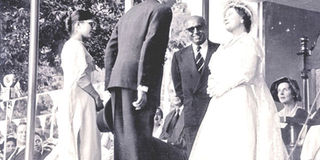Basheer Mauladad: A life of service

Basheer Mauladad with Queen Elizabeth, The Queen Mother in 1958. Kenyans recently buried Basheer Mauladad, the scion – and last remaining male member – of a renowned family which straddled the divide of race, politics and class. PHOTO/COURTESY
What you need to know:
- Politics aside, Mr Mauladad was also philanthropic. When the Asian community leaders were encouraged soon after independence by Mzee Kenyatta to discard electoral politics, Mr Mauladad retreated though he remained political to his last day.
- Mr Mauladad also played an unrivalled leadership role for Muslims, focusing on developing Muslim Girls School which his father and my grandfather, Abdullah Mir, had helped build in the 1930s.
- This appreciation of Mr Mauladad would be incomplete without a mention of cricket. He became captain of the Asian Under-23 Test team.
Kenyans recently buried Basheer Mauladad, the scion – and last remaining male member – of a renowned family which straddled the divide of race, politics and class.
Among his accomplishments was facilitating access to influential diplomats for nationalists like Jaramogi Oginga Odinga and Mbiyu Koinange whose moves were closely watched by colonial authorities. He also led the way in breaking the colour bar.
What Mr Mauladad and others achieved then could never be replicated in politics now. The power of those outside the inner circle has been steadily eroded as presidents increasingly turn to cohorts to determine policy.
There have been numerous Kenyan Asians renowned for their courageous contributions to the freedom struggle and to its democratic and economic emancipation.
But Mr Mauladad was probably the most vibrant of a small group of well-to-do Asians in the immediate pre-independence period who supported liberation leaders even though it could jeopardise his wealth.
The others he worked closely with were Tom Mboya, Charles Njonjo and Charles Rubia whom he helped become Nairobi’s first African mayor.
COLOUR BAR
Nothing equalled Mr Mauladad’s daring entry into the then hallowed whites-only halls of the New Stanley Hotel.
One evening, he reserved a table for four. When his group walked into the hotel, patrons and waiters were struck dumb at the sight of Asians. Then, someone got up from a chair and took them to a table. Everyone relaxed. The one who did the honours was the hotel owner, Abraham Block! From then on, the hotel became multi-racial.
Another story Mr Mauladad would proudly tell was of his visit to Maralal as leader of an Asian delegation to express support for Jomo Kenyatta who was detained there.
They were received by Mzee who also introduced them to his wife Ngina. Unknown to them, Mama Ngina made a meal of cauliflower from the vegetables she grew in her simple garden. The delegation was to have lunch with the powerful district commissioner but Mr Mauladad chose Mama Ngina’s!
A few years later, Mr Mauladad arranged meetings at the request of the famed Indian High Commissioner, Apa Pant. They were the stuff of cloak and dagger games that needed to be played.
A First Secretary at the High Commission asked Mr Mauladad to join a bridge-playing group at his house.
But bridge at the lower-level diplomat’s unmarked house was a ruse which permitted contact with Koinange and Mboya whom Basheer would bring along so that Mr Pant could brief PM Jawaharlal Nehru on strategies for Africa’s independence that India could promote at Non-Aligned Movement meetings.
At the coronation of Prince Karim Aga Khan in 1957, Jaramogi stunned all when he said, “Mauladad, we have not forgotten what you did for us.”
Politics aside, Mr Mauladad was also philanthropic. When the Asian community leaders were encouraged soon after independence by Mzee Kenyatta to discard electoral politics, Mr Mauladad retreated though he remained political to his last day.
What was particularly remarkable was that his achievements in the social realm took place in his youth. He was elected vice-chairman of Sir Ali Muslim Club at 21 and chair at only 27, the same age he became a councillor. That was in 1958. At 23, he was appointed a member of the Central Rent Control Board. At 31, he was elected chairman of Suleiman Verjee Indian Gymkhana.
EDUCATION FOR GIRLS
He was 32 when he was named by the City Council to head preparations for 1963 Jamhuri Day celebrations.
Mr Mauladad served at the Aga Khan Hospital board and was eventually appointed vice-chairman in 1967.
Mr Mauladad also played an unrivalled leadership role for Muslims, focusing on developing Muslim Girls School which his father and my grandfather, Abdullah Mir, had helped build in the 1930s.
This appreciation of Mr Mauladad would be incomplete without a mention of cricket. He became captain of the Asian Under-23 Test team.
And there is his wife, Baji Nusrat, a brilliant woman who broke accepted mores and helped him in all his initiatives.
His passion for people and history brought to fruition in 2010 an outstanding book on the history of the Asian Muslim community in Kenya, Settlers In A Strange Land, written by Cynthia Salvadore.
The book’s greatness was owed primarily to Basheer Mauladad, who provided the bulk of its content. It is the greatest material legacy he has left behind, but true to form, the book hardly mentions anything about his contributions to history.





